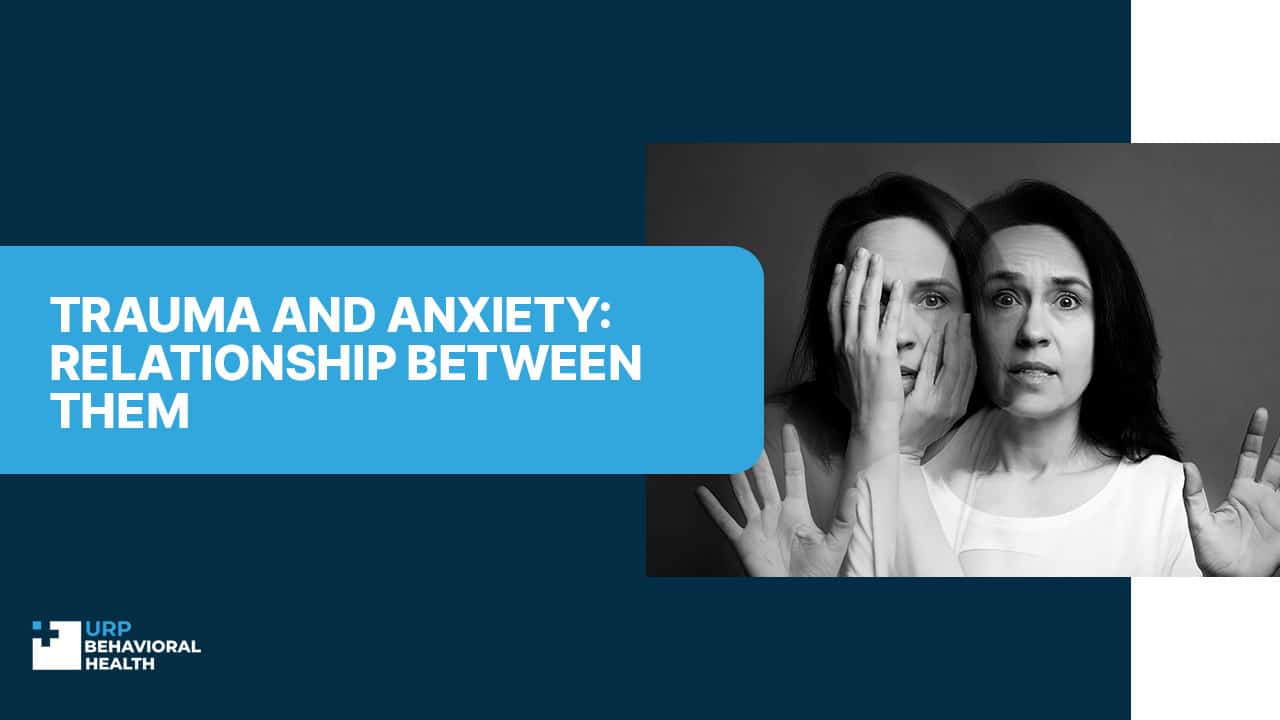
Trauma and Anxiety: Relationship Between Them
Can a traumatic event cause anxiety disorder? Though it might seem that trauma and anxiety don’t have much in common, these conditions are tightly linked. Trauma is a one-time event, while anxiety is a persistent feeling of worry. These conditions have varying symptoms but tailored treatment approaches. Healthcare professionals carefully assess the symptoms of individuals experiencing trauma and anxiety before making any prescription decisions.
What Is Trauma?
To clarify the difference between anxiety and trauma, let’s examine each concept separately. Trauma refers to the emotional and psychological impact of experiencing distressing events. They can be emotionally shocking or life-threatening. These events might leave an imprint in the form of trauma and influence mental and physical well-being. Determined by the trauma severity, it might have far-reaching consequences and even develop into a mental disorder.
Medical experts distinguish these types of trauma:
- Acute trauma. A single stressful or hazardous event causes this kind of trauma.
- Chronic trauma. It arises from recurring and enduring exposure to stressful factors.
- Complex trauma. Numerous traumatic events can be embodied in complex trauma.
- Secondary or vicarious trauma. The so-called trauma of a witness appears from communication with a person who has undergone a devastating event. [1]
Contact our admissions team now to begin your path toward a brighter future.
What Is Anxiety?
Anxiety is a condition encompassing feelings of worry, restlessness, and fear regarding the future or certain situations. Psychologists have different approaches to anxiety emotions arising in the majority of people during their lives from severe disorders. The latter comprise many types, for example:
- Generalized anxiety disorder (GAD). Steady and superfluous worry about routine activities or situations.
- Panic disorder. It’s expressed in periodic panic attacks and fear of their sustained occurrence.
- Social anxiety disorder. People experiencing this condition tend to avoid social interactions due to the fear of judgment or embarrassment in public.
- Intensive fright of definite objects or scenarios. It causes considerable distress and the urge to avoid them. [2]
- Trauma-induced anxiety. This condition happens under traumatic impact.
Can Traumatic Events Cause Anxiety?
When it concerns enduring worry, one of the main questions about its origin is: “Does trauma cause anxiety?” The answer is yes, doubtlessly. A painful event or constant distress can provoke some kind of anxiety disorder. Trauma can impair a person’s sense of safety, generate persistent anxiety, and make rest and a sense of security imperceptible. Some symptoms of these two conditions might overlap, and others work separately. That’s why it’s vital to figure out the relationship between them for effective treatment.
How Does Trauma Contribute to Anxiety?
Trauma initially affects sufferers on a neurological level. It impacts brain regions engaged in emotional regulation: the amygdala and prefrontal cortex. It leads to a superfluous perception of possible dangers and, consequently, to anxiety from trauma. The second problem is that the affected amygdala, responsible for detecting risky events, can fail to distinguish former and present hazards. Thus it leads to the fixation of memories regarding traumatic events. [4]
Altered brain reactions contribute to a towering state of vigilance and anxiety. It happens when a traumatic experience comes to mind and triggers the body’s stress reaction. It’s called the “fight, flight, or freeze” response. The choice between them occurs unconsciously. It’s expressed in a person’s urge to combat a threat, run away, or stay to remain unnoticed. [5]
Don’t wait - confidential help is available right now for you or your loved one.
Symptoms of Trauma-Related Anxiety
Symptoms of trauma-related anxiety can imbricate with PTSD. It makes them even more severe in comparison with other anxiety disorder symptoms. They influence the emotional, physical, behavioral, and cognitive spheres of human life.
- Persistent worry. It’s one of the main symptoms defining anxiety disorder.
- Meddling thoughts and memories. Originating from traumatic experiences, they can become embodied in overwhelming distress.
- Annoyance and mood swings. Sudden shifts in emotional state are usual for sufferers of trauma-evoked anxiety.
- Guilt, shame, and self-blame. Disapproving reflections about oneself or others are shared.
- Brisk heartbeat, dizziness, trembling, etc. There is a wide range of physical symptoms up to developing chronic pain and headaches.
- Sleep disturbances. Patients can tell about sleep problems or insomnia.
- Avoidance behaviors. It’s a characteristic feature of this type of anxiety to avoid everything attributed to the traumatic event.
- A person is forced to live in a state of consistent alert.
- Memory problems and difficulty concentrating. People can experience partial memory loss in traumatic situations. They also might have trouble focusing due to intrusive thoughts. [6]
The Cycle of Trauma and Anxiety
An emotionally painful experience can lead to entrapment in the cycle of anxiety and trauma. The sufferers can’t break it permanently, returning to fear and consistent worry associated with the past traumatic event. This cycle starts with feeling challenged and experiencing arousal or fear. Then there is a peak in emotional arousal, and afterward, struggling to return to a regular life. It can be challenging to quit the cycle on your own. That’s why sufferers might need professional help from qualified mental health specialists.
Treatment and Coping Strategies
Treating trauma-related anxiety involves a fusion of therapeutic approaches, self-care strategies, and lifestyle modifications. Among them are the following:
- Cognitive behavioral therapy (CBT). It targets detecting and changing negative thought and behavior patterns related to anxiety and trauma.
- Exposure therapy. Patients are successively exposed to anxiety-provoking events or memories in a controlled environment to develop resilience.
- Dialectical behavior therapy (DBT). This therapy for trauma and anxiety helps individuals better manage their emotional responses and develop mindfulness skills.
- Cognitive processing therapy (CPT). It integrates exposure with cognitive restructuring to restore the mindset harmed by trauma.
- Eye movement desensitization and reprocessing (EMDR). It helps treat traumatic memories and symptoms, for instance, flashbacks and intrusive thoughts.
- Self-care practices. It includes mindfulness approaches, healthy lifestyle choices, physical exercises, creative activities, support networks, etc.
- SSRIs and SNRIs are leading choices for coping with anxiety disorders.
Some people wonder, is anxiety caused by trauma? Not always, but it can be. Life-threatening events might induce anxiety disorder and make it more severe. Therefore, if you or your loved ones experienced something like that, contact therapists from URP Behavioral Health to help you get through this.
Reach out today and let us create a treatment plan designed around your needs.
References:
- Trauma-Informed Care Implementation Resource Center. What is Trauma? https://www.traumainformedcare.chcs.org/what-is-trauma/
- World Health Organization. Anxiety disorders. https://www.who.int/news-room/fact-sheets/detail/anxiety-disorders Sep 27, 2023
- Severn Pain and Injury Care. Exploring the Link Between Trauma and Anxiety. https://severnclinics.co.nz/exploring-the-link-between-trauma-and-anxiety/
- Hope Gillette. What’s the Relationship Between Trauma and Anxiety? https://www.healthline.com/health/anxiety/whats-the-relationship-between-trauma-and-anxiety. Jan 22, 2024
- Understanding Trauma-Induced Anxiety: Causes, Symptoms, and Treatment. https://www.grouporttherapy.com/blog/trauma-induced-anxiety
















